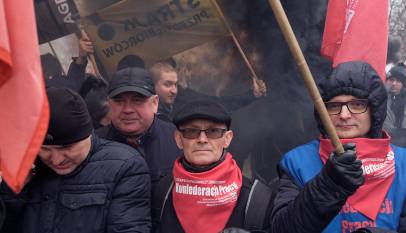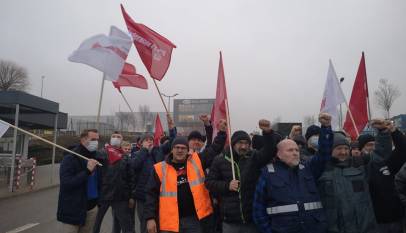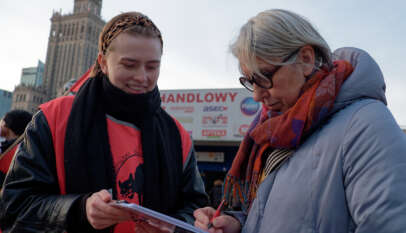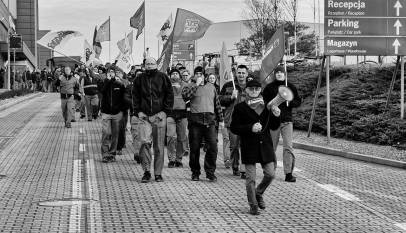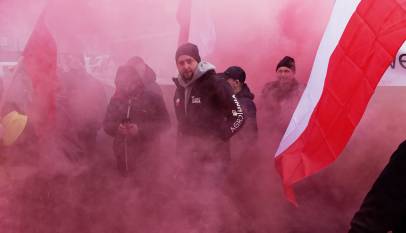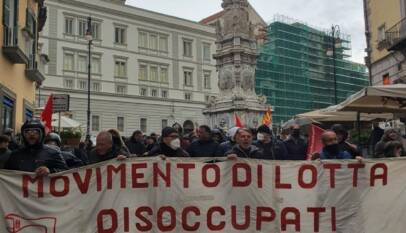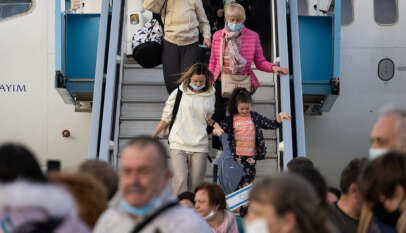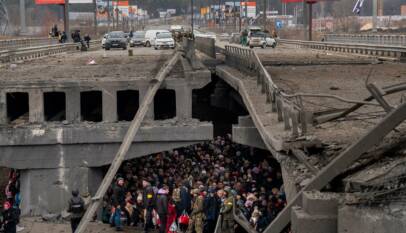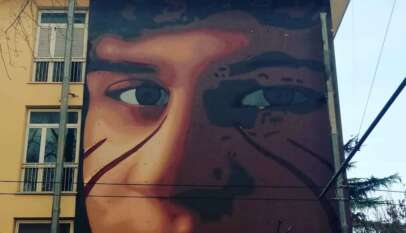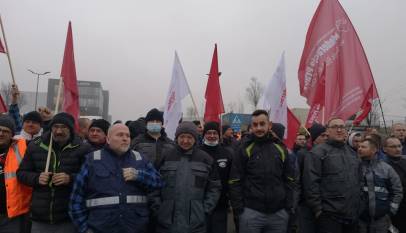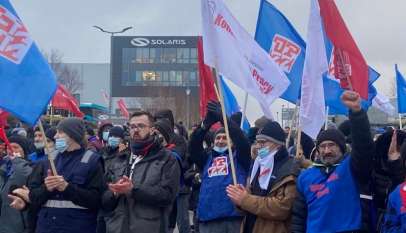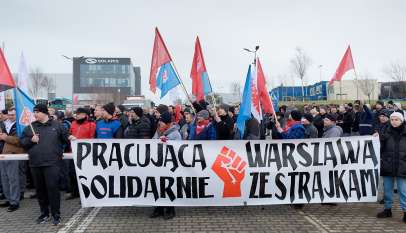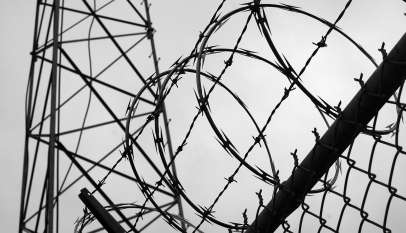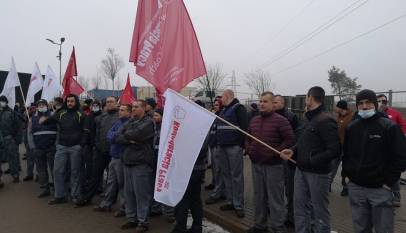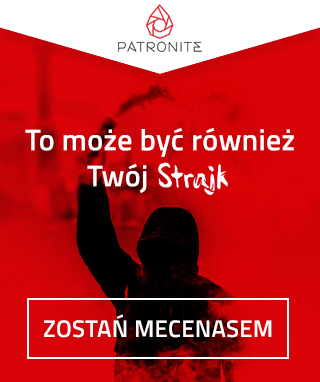
The strike in Solaris has been going on for three weeks now. The bus factory in Bolechowo, part of the Spanish concern CAF, is not releasing new vehicles, but the management stays silent and even refuses to issue new official commentaries for the tress. Meanwhile, the Left, which has supported the protest since day one, has alerted the head of Spain’s left-wing government about the issue.
In the second week of the strike Solaris was visited by MP Maciej Konieczny (Lewica Razem) and the co-chairman of the New Left, deputy speaker of the Sejm Włodzimierz Czarzasty. The latter wanted to meet with the company management, which – traditionally – refused, hiding behind the pandemic. Now the New Left leaders have sent an open letter to the Spanish Prime Minister Pedro Sanchez.
– The management of the company did not allow Andrzej Radzikowski, the chairman of the largest Polish trade union OPZZ, who is also the chairman of the Social Dialogue Council, into the premises of the plant, write Polish Social Democrats to the head of the Social Democratic government of Spain. – Management is blocking access to trade union lawyers, unions’ experts and advisors. This is not only a violation of the principles of social coexistence, but also of international law.
The authors of the letter go on to point out that Solaris is owned by the Spanish company CAF and call for contact to be made with Javier Calleja, also a Spanish citizen and the current president of Solaris.
During the third week of the strike at Solaris, Rafał Dutkiewicz appeared at the company. The former mayor of Wrocław is to undertake a „goodwill mission” between the management and the protesting employees. They are determined to fight until the board agrees to raise their salaries by 800 PLN gross.
Wojciech Jasiński, chairman of the labour confederation at Solaris, says in a conversation with us that so far there has been no breakthrough. The strike continues.
– We talked with Mr Dutkiewicz, but there was still no meeting with the management. We are on strike, there is full readiness of the crew. On Monday some workers will take part in a rally organised by Inicjatywa Pracownicza under the slogan „I stand with the strikers in Solaris”. With all due respect to mayor Dutkiewicz – the fact that the board is not talking to us but has sent such an intermediary instead shows the attitude of the board and shows that the board still does not want to start talks. And the strike will end when there will be pay rises for us – explains the trade unionist.
A few hours later, we find out the board and the workers did meet up, with Dutkiewicz as facilitator. However, the meeting was absolutely fruitless as the company did not react to the workers’ essential demand.
https://strajk.eu/strajk-solaris-dutkiewicz/
Early in the morning on 11 February, a group of activists built a structure in the gate at Siedmiogrodzka Street, Warsaw, preventing free access to the Budimex SA headquarters. After a swift action, the builders of the obstacle disappeared, leaving a symbolic wall marking their disagreement with the Budimex’s construction of a dam on the Polish-Belarusian border.
The Budimex SA representatives called the police to the site, as the happening prevented official cars from entering the company’s premises.
This is another protest action in recent days. In the previous weekend, demonstrations of opposition were held in many cities in Poland.
The Budimex SA is one of two companies that won the tender to build the dam on the border. Work started on 25 January and will last for about six months. The dam will be several metres high, topped with razor wire barbed wire. The wall will stretch for 180 km along the border with Belarus. From the very beginning the idea aroused controversy and social opposition. The special law on the basis of which the dam will be built bypasses public consultations, construction law and all nature protection regulations.
Since 9 February, another, third hunger strike has taken place in the Guarded Centre for Foreigners in Wędrzyn, which is located in the military training ground. It is the first time that so many people have taken part in it. The entire block is protesting – over 100 people of various nationalities – mainly Iraqis.
According to our informants this was as a result of a court sentence for one of the migrants staying there. The man had already spent 6 months in confinement and the court extended his stay in the centre for another 3 months. This caused a huge wave of frustration and dissent and a hunger strike was launched. One whole block of 207B, over 100 people, joined the protest, joined by residents from other blocks.
Police have arrived on the scene, but so far the strike is being conducted peacefully. The migrants are protesting against the terrible living conditions (there are about 20 people in the rooms), the confinement, the isolation and the lack of information about what their legal status is when they will be able to go free. They also complain about difficult access to medical and psychological care. According to our sources, the day before yesterday one of the persons had heart problems, complained of pain in the chest, but was not helped quickly. The blocks are closed for the night, so the services guarding migrants in the centre did not hear the cries for help, which prolonged the waiting time for a doctor. According to our interviewee, the patient was ignored and help had to be called several times.
Left-wing MPs did not join the Sejm in commemorating Zygmunt Szendzielarz „Łupaszko”. – Paying homage to people who have the death of women and children on their conscience should never take place in the Polish Sejm,” comments MP Maciej Konieczny.
The tribute to „Łupaszka” was decreed expressly by the Sejm Marshal Elżbieta Witek. It is customary for Polish parliamentarians to commemorate, by rising from their seats at the beginning of a sitting, distinguished persons who have recently died or whose anniversary of death falls on a given day or earlier. Zygmunt Szendzielarz a.k.a. „Łupaszka”, a prominent anticommunist fighter of the post-war time, was executed on 8 February 1951. The Speaker of the Sejm decided to commemorate him on the anniversary without consulting the Sejm Presidium. The majority of parliamentarians had no problem with the figure of „Łupaszka” and stood up from their seats. They even chanted „Honor and glory to the heroes!”.
But not the Left, which has long insisted on remembering the civilian victims who fell at the hands of the „cursed soldiers”.
– Troops under „Łupaszka” are responsible for the crime in Dubinki. In June 1944, in this village, they murdered several dozen people of Lithuanian nationality, mainly women and children,” wrote MP Maciej Konieczny on Facebook. The Dubinki case has been investigated and described in detail. There is no doubt that Łupaszka’s unit killed defenceless villagers in this village (today, it is a town on Lake Ośwa in eastern Lithuania) in order to take revenge on Lithuanians for the murder of 38 Poles in Glinciszki by Lithuanian collaborationist auxiliary police. Historian Paweł Rokicki considered both events as war crimes.
https://strajk.eu/lewica-nie-uczcila-lupaszki-w-sejmie-podle-przedstawienie-pis-i-marszalek-witek/
On the left there has been a debate for several weeks about a possible coalition with the parties of the centre, or centre-right, the Polish People’s Party and the Poland 2050.
25 percent. – This is the amount, theoretically, that the coalition Lewica-PSL-PL2050 is currently able to gain. However, this is not the maximum, but the average of the last months. Therefore, it is worth considering whether this kind of ranking makes sense and whether it is worth investing in it.
https://strajk.eu/koalicja-lewica-psl-pl2050-czy-to-ma-sens/
How is the war in Ukraine changing Poland?
The Russian invasion of Ukraine is changing the whole world. Its consequences are felt by …

